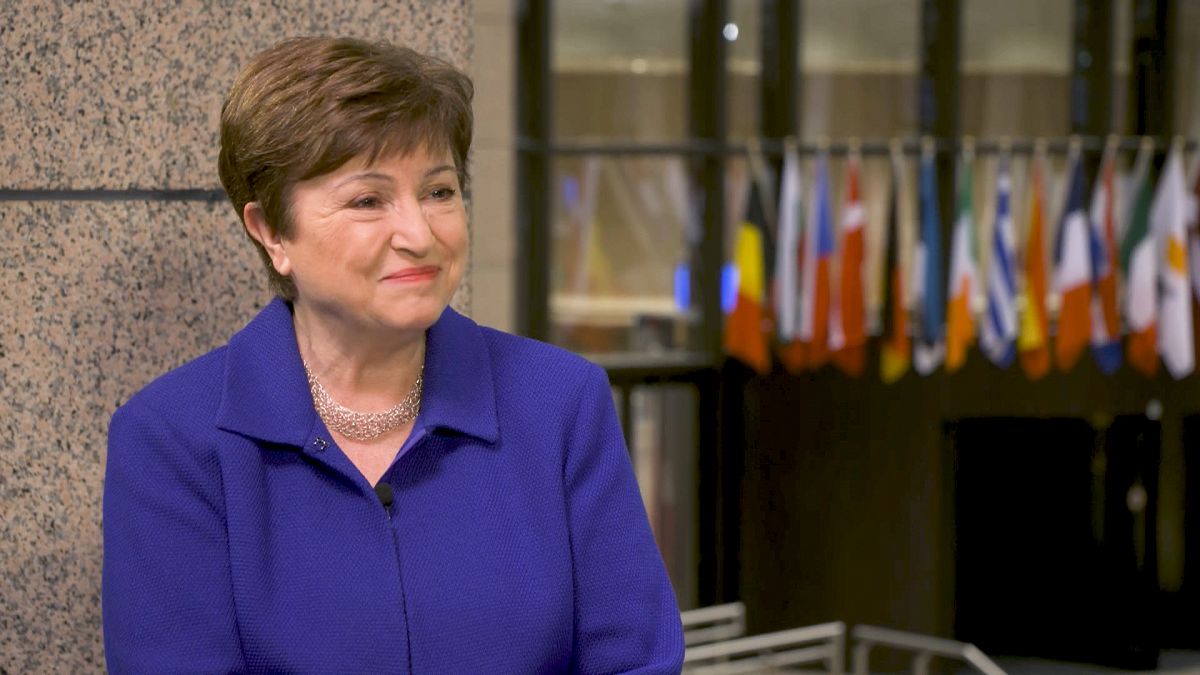International Monetary Fund managing director Kristalina Georgieva praises EU's recovery efforts and warns against "the suffocating force of austerity".
The European Union should not put economic recovery in danger with “the suffocating force of austerity,” IMF managing director Kristalina Georgieva has told Euronews.
Georgieva praised the EU’s Next Generation recovery plan, describing it as a “remarkable” act of solidarity between European nations.
And she told Global Conversation’s Efi Koutsokosta that the Europe of the future needs to be "innovative, vibrant, highly-skilled and agile," if it is to help take the world forward.
Kristalina Georgieva: What we're seeing is that the recovery in the euro area is strong. For this year we project 5% growth, for next year 4.3%. That comes after last year it shrank by six and a half per cent. So this rebounce (rebound) is very impressive. It is based on three pillars. Vaccinations, policy support and businesses and people learning how to function with the pandemic still around us. What we saw was in the third quarter, a very significant increase. But as your question indicates, in the fourth quarter growth prospects are weaker. They're weakened by an increase in infections. In that sense, the uncertainty of the new variant does not help.
Efi Koutsokosta: How deep could this dent be?
Kristalina Georgieva: We don't expect any significant downgrade for the eurozone. We think that the most important element is the fact that businesses and consumers are operating, relatively speaking, soundly, despite the fact there is an increase in infections and that is supported also by continuous policy measures.
Inflation Fears
Efi Koutsokosta: There is another factor that we've seen also in your forecast and it's inflation. So, is rising inflation a real threat to economic progress and living standards?
Kristalina Georgieva: In the eurozone inflation is transitory. It is driven by the energy price, supply disruptions and also by the fact that we are seeing more demand picking up after the years of close-downs. That, we expect is going to recede in 2022. So by the end of next year, inflation would be relatively speaking weak, below the ECB's 2% target. And this is why our message is: don't rush into tightening monetary policy because you may throw cold water on prospects for growth, not for a good reason. In other words, inflation expectations in the eurozone are well anchored. Now this being said, if there is a push on wages, if there is a real estate market problem or if China...
Efi Koutsokosta: We can already see this...
Kristalina Georgieva: ...if these problems become more pronounced, of course, conditions may change. And this is why the ECB has to be very vigilant, recognise that risks are on the upside.
Efi Koutsokosta: But given that the pandemic is far from over, there are questions here in Europe over the debt accumulated by governments in order to support their economies and health systems. The EU is expected to visit the issue next year. What should be done?
Kristalina Georgieva: So let me first say that exactly, for this reason, the ECB has to be very careful not to tighten financial conditions prematurely and without a sound reason, because high levels of debts today are accompanied with a lower-than-before-the-pandemic level of debt service. Fiscal rules. If we go to reinstalling fiscal rules in 2023, this would be counterproductive to the recovery in the eurozone and it is actually undesirable. So our recommendation is: please don't do it. Think about changing the rules, so they are simpler, they are implementable and they rely more on national ownership: on countries watching over their fiscal position.
European debt is piling up
Efi Koutsokosta: You know, the International Monetary Fund was a cheerleader of austerity measures a decade ago, after the financial crisis. Would you make the same assessment now that Europe's debt is piling up?
Kristalina Georgieva: Europe's debt has gone up for a good reason: to put a buffer when the economy was put on standstill, so the households and businesses were to continue to function. We have unemployment at levels from before the pandemic, we don't have bankruptcies all over the place. That is a very sound outcome of the policy decisions made. And of course, we want to see a strong recovery, medium-term rebuilding buffers addressing that, but not doing it with the suffocating force of austerity.
Efi Koutsokosta: But we still see that both recovery and debt levels are not evenly distributed in Europe. Countries like Italy, Greece and Spain are in much greater trouble. Do you see the old division between the south and the frugal north being revived?
Kristalina Georgieva: One of the beautiful things about Europe is that Europe, in a moment of crisis, comes together and the act of solidarity that Next Generation EU presents, it's just remarkable. What it does, it directs more help to the countries that need it the most and it is putting the European borrowing capacity for the first time in service to the European people. We expect to see that kind of solidarity, camaraderie continuing because of the green agenda.
Efi Koutsokosta: So to wrap up, reducing debt, boosting green and digital investment while bringing back rules. How could this be done and what should Europe prioritize?
Kristalina Georgieva: First and foremost, Europe needs to prioritize the recovery from the pandemic and support structural reforms and structural transformation, which is to take it to a green and digital future. Not an easy task, because it requires investment, public and private, and it requires reskilling and upskilling Europe's labour force. If you set your eyes on what you want Europe to be 10, 15, 20 years from now: you want it to be innovative, vibrant, high skill, agile, able to take the world forward.



